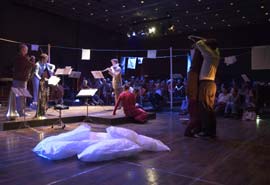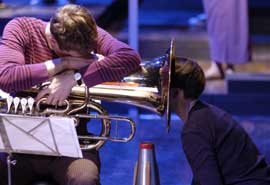Breakfast Opera
every morning, everywhere in the world, people have breakfast. It is a daily ritual which is highly shaped by individual preferences and cultural influences. Makiko Nishikaze and the ensemble Maulwerker transform this subject into a spatial musical situation. The composition integrates sounds, gestures, smells, voices, images, and various languages. The focus on the mundane opens up a space for new perceptions, and investigates the intentions of our activities.
WP: BAM! – Berliner Festival für aktuelles Musiktheater 20. /21.September 2018 Acker Stadt Palast Berlin


Breakfast Opera (2018)
for 4 performers, kitchen and tape in various languages
65 min.
ppt(2013)
spacial composition for
5 vocalists with instruments and objects
MM (2004/05)
for Mezzo Soprano, four vocalists and chamber orchestra
70 min.
oratio (2000)
for five voices
CHANT I, II, III
for solo voice (Christian Kesten)
Ach, Piano! I und V (2015-16)
for piano (four hands)
for female voice & Clavichord
(or piano)
| *1968 in Wakayama (Japan). Nach Abschluss ihres Kompositionsstudiums an der Universität Nagoya in Japan, setzte sie ihr Studium am Mills College in Oackland (Kalifornien) bei Alvin Curran und an der Universität der Künste Berlin bei Walter Zimmermann fort und schloss 1999 als Meisterschülerin ab. Die Musik von Makiko Nishikaze ist zurückhaltend und subtil ohne schrille Akzente. Die Zuhörer werden durch die der Komposition innewohnende Konzentration zur Aufmerksamkeit verführt. Sie lebt und arbeitet in Berlin. An Preisen und Stipendien erhielt sie u.a. das Kompositionsstipendium des Berliner Senats (2010), Deutsches Studienzentrum Venedig (2011), Künstlerhaus Schloss Wiepersdorf (2013), Casa Baldi Olevano Romano (2014), AIR Krems (2014). Ihre Werke wurden weltweit aufgeführt. http://www.makiko-nishikaze.de |
The composer Makiko Nishikaze and the director Christian Kesten conceive an installative spacial musical theatre, based on the literary foundation of the Gospel of John, chapter 20, which focuses on Mary Magdalene.
Christian Kesten on the production: "In my work on a new form of music theatre, 'space' is treated as a musical parameter. Space is the field in which less music and theatre and more acoustic and visual perception touch."
The floor of the Werner-Otto-Saal in the Konzerthaus consists of 132 elevating platforms, which the visual artist Kai Schiemenz transforms into a landscape populated by singers, musicians and the audience alike; they are all in one room.
Singers and instrumentalists form different constellations by distributing them throughout the room. Due to the different distances, the spectator is not only acoustically aware of the space in which he or she is located, but also physically perceives the space in which he or she is located.
Composition and staging create hand in hand by designing the constellations different spatial structures. Each spectator has his or her individual listening and viewing angle of the piece and, just like any singer or instrumentalist, takes part in the shared space.
The Maulwerker and the Kammerensemble Neue Musik Berlin
Director: Christian Kesten
MaerzMusik Festival for contemporary music 2006, Konzerthaus Berlin
oratio
oratio is a spatially related piece; the changes in position of the performers in the room influence the perception of the sounds.
"The theme of my work is 'hearing'.
I question all our tendency to perceive music more and more in a passive way. We tend to follow the sounds - myself included - just as they appear. What I try to achieve in my music is to create sounds that invite attentive listening. While I limit the gestural material of my music, I am very interested in subtle changes: of notes, intervals, density and timbre through different instrument or voice combinations. Through all this I try to create an unpredictable flow that invites the listener to participate in the development of the music in the real moment. (Makiko Nishikaze)
